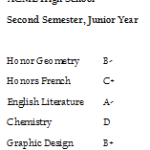Every parent of high-school aged children tells me, “No one helped me find a College to attend when I was in High School!”. Most then go on to say “I wish they had.” and “There’s no way I could have figured out how and where to apply, in today’s College environment.”. A few (brave? ignorant?) parents say proudly “I am letting my kid be in charge of this process. I THINK it’s going pretty well.”
|
The #1 LOGICAL reason to help your child find the right College?
MONEY!

Does money motivate you?
- A student left to their own devices may not realize that a private school may be much more liberal with financial aid than the public school in their state: in-state public school tuition costs can actually be MORE expensive than a private College!
- They may not figure out that a reach school is MUCH less likely to offer merit aid than a safety school.
- Neither of you may realize that you can contest FAFSA’s OR CSS Profile’s assessment of your ability to pay, if there are extraordinary circumstances in your home that were not accurately reflected in your financial aid forms. (Are there extra family members living in the home that increase your expenses? Do you have extensive medical bills that you are struggling to pay off?)
- Or they may not think about money at all, and be extremely disappointed when they get into their dream school, only to hear you say “There’s no way we can afford for you to attend that school”, after you meet with the College’s financial aid officer and determine the costs.
The #1 EMOTIONAL reason to help your child search for the right College?
HAPPINESS!
We live in a small town, my daughters attend a small High School. When I asked my Sophomore to tell me what she would want in a College, she said “I want a BIG College in a BIG town”. In other words, not what I have now!

Help Your Student Make a College Choice That Will Make Them HAPPY
I found a medium-to-small College NEAR a big town that I was sure she would love, and took her on a tour. She loved that school. I nicely pointed out that it was not a big College nor in a big town, so remember to be open-minded in her College Search. That experience was much more powerful for her than me TELLING her that maybe she might not want to attend a big school in a big town. You know your kid, and you know a lot more about the College experience and life in general – help your 16, 17, 18 year old figure out what they really want, not what they think they want. Remember, they are beginning to consider themselves as adults capable of making their own decisions. The way you give them advice can positively or negatively impact how they take that advice.
The College Search is a whole new game, much more complex and difficult than when we attended College. I am hearing more and more stories of students coming home from a College and not going back, either attending a Community College while they try to figure out what they want to do, or transferring from College A to College B because they did not like College A. While not the end of the world, transferring Colleges is expensive:
- Did they complete the quarter/semester, or become so miserable, they left early?
- Will College B accept all of the credits from College A?
- Does College A and College B have different core requirements? Most likely!
This all translates to more tuition, as it will likely take longer to graduate.
Transferring Colleges is disruptive and stressful, even if that transfer is the best thing for the student. Do the academic calendars line up, or is the student sitting at home waiting to start College B, wondering if they have made a mistake, or possibly feeling like they somehow failed? It’s easier to start at a College at the same time as the rest of the Freshman, who are all new to the environment. That transition is HARD, which is why a key factoid Colleges share is their Freshman retention rate. Colleges implement many programs for incoming Freshman to get oriented and to feel they belong, to increase that retention rate. Coming in later that year or in future years can be a hard transition, both academically and socially.
 Help your student! If you don’t have the time or tend to butt heads, find the money to hire a College Counselor. It may not come cheap, but outside buying a home, your child’s post-High School education will likely be the biggest investment you make (or the biggest loans your child acquires). Spending some money up-front will likely save you money in the long run, and net a better outcome for your child’s happiness and success.
Help your student! If you don’t have the time or tend to butt heads, find the money to hire a College Counselor. It may not come cheap, but outside buying a home, your child’s post-High School education will likely be the biggest investment you make (or the biggest loans your child acquires). Spending some money up-front will likely save you money in the long run, and net a better outcome for your child’s happiness and success.
© Complete Systems, LLC dba Elligiblecollegestudent.com, All Rights Reserved
*** Elligiblecollegestudent.com is a division of Complete Systems, LLC ***
Disclaimer
 Publisher Ranking Anxiety is my term for why Colleges that choose to take a holistic approach to admissions still focus on factors like test scores and GPA, because they are still worried how they will be ranked by publications such as the US News & World Report.
Publisher Ranking Anxiety is my term for why Colleges that choose to take a holistic approach to admissions still focus on factors like test scores and GPA, because they are still worried how they will be ranked by publications such as the US News & World Report.




